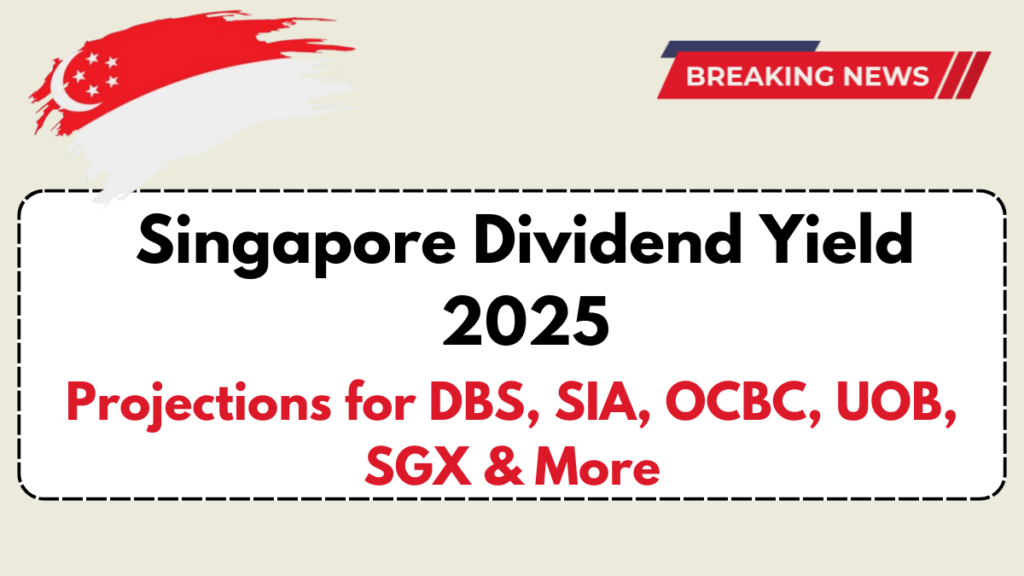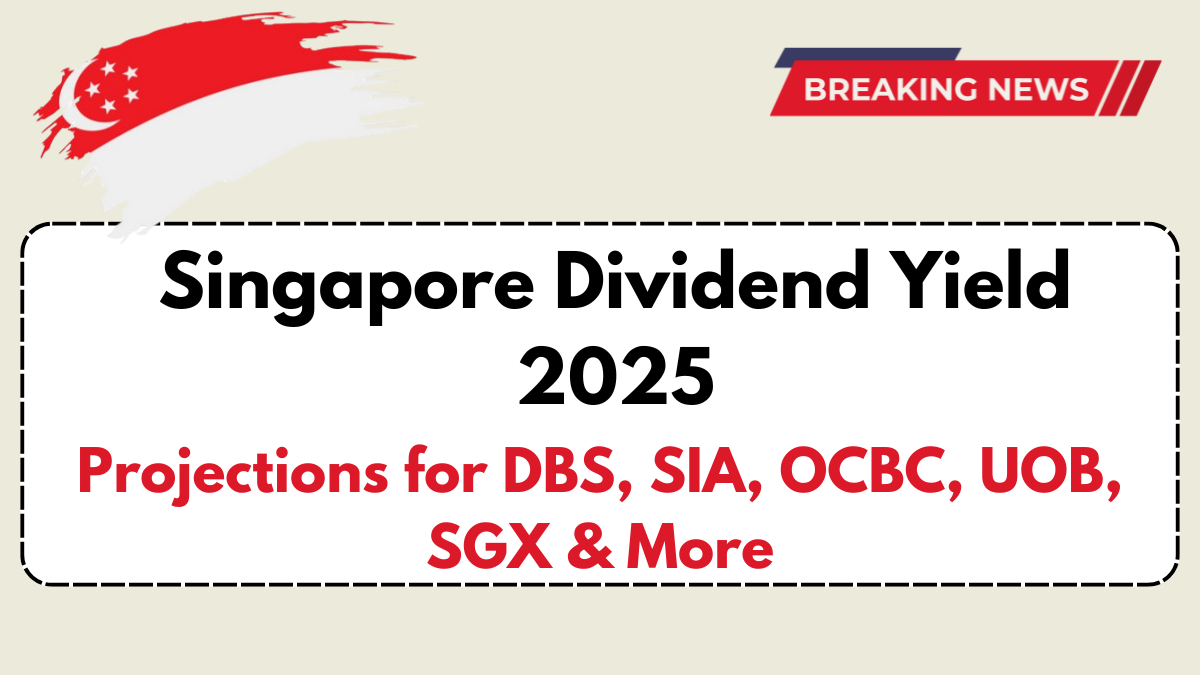Dividend payouts serve as a key strategy for companies to reward shareholders and attract long-term investments. In Singapore, major corporations such as DBS, OCBC, UOB, SIA, and SGX follow structured dividend policies that not only benefit investors but also contribute to market stability and growth. This article explores the 2025 dividend yields of these companies, taxation policies, and what investors can expect in the coming year.

Understanding Singapore Dividend Policies
Dividends represent a portion of a company’s profits distributed to shareholders. In Singapore, dividend policies are designed to encourage investment and ensure fair financial practices. The country’s corporate regulations allow businesses to distribute dividends from their earnings, fostering an investment-friendly environment.
There are two primary categories of dividends in Singapore: taxable and non-taxable dividends. Understanding these classifications is crucial for investors looking to maximize returns while managing tax liabilities.
Taxable Dividends in Singapore
Taxable dividends are those subject to income tax depending on the recipient’s tax residency and applicable tax laws. The key points to note include:
- Dividends received from foreign companies that have not benefited from Singapore’s tax treaties are usually taxable.
- Individuals receiving dividends from non-resident companies should be aware of withholding tax policies that may apply.
- Taxable dividend rates vary based on specific tax treaties and local regulations.
Non-Taxable Dividends
Non-taxable dividends are highly beneficial for investors, as they help optimize returns without additional tax burdens. The following types of dividends fall into this category:
- Dividends from Singapore-Resident Companies: Most dividends paid by Singapore-incorporated companies are exempt from tax under the one-tier corporate tax system.
- Dividends from Real Estate Investment Trusts (REITs): These dividends are generally tax-exempt for individual investors, but corporate investors may be subject to tax.
- Foreign-Sourced Dividends: If the foreign dividends are received by a Singapore tax resident company and meet the conditions under the tax exemption scheme, they may not be taxable.
Singapore Dividend Payouts for 2025: Key Companies
The following table provides an overview of dividend payouts and related details for major Singaporean companies in 2025:
| Company | Dividend Yield (%) | Share Price Target (SGD) | Dividend Payment Frequency |
|---|---|---|---|
| DBS | 5.3% | 43.00 – 46.91 | Quarterly |
| SIA | 5.84% | 4,745.42M revenue (Q2) | Annually |
| OCBC | 4.97% | 16.10 – 20.80 | Semi-Annual |
| UOB | 5.69% | 37.50 – 40.20 | Semi-Annual |
| SGX | 3.71% | 0.53 earnings per share | Quarterly |
DBS Bank Dividend Outlook
DBS has demonstrated strong financial growth, reflected in its dividend payouts. The latest projections indicate that:
- The dividend yield stands at 5.3%, maintaining stability in investor returns.
- Analysts predict the share price to range between SGD 43.00 and SGD 46.91, with an average upside of 3.8%.
- A significant 53% increase in share issuance has been approved for the final quarter, rewarding long-term investors.
- Bonus shares will be distributed to shareholders with over 10 years of investment in the company.
Singapore Airlines (SIA) Dividend Performance
Singapore Airlines continues to show resilience in the aviation sector. Highlights for its 2025 dividend payouts include:
- Expected revenue for Q2 2025 is $4,745.42 million, with full-year revenue projected at $19.11 billion.
- Earnings per share (EPS) are estimated at $0.73.
- Shareholders will benefit from a $S0.50 per share dividend increase.
- The dividend yield currently stands at 5.84%, providing attractive returns to investors.
OCBC Bank Dividend Overview
OCBC remains a stable dividend-paying stock with a track record of strong performance. In 2025:
- The dividend yield is 4.97%, slightly below its 5-year average of 5.07%.
- The share price target ranges from SGD 16.10 to SGD 20.80, with a median target of SGD 17.79.
- The bank’s total assets, including trust and global banking divisions, amount to $S151 billion.
UOB Dividend Yield & Stock Performance
United Overseas Bank (UOB) continues its semi-annual dividend payouts, benefiting long-term investors. Key insights for 2025 include:
- Dividend yield stands at 5.69%, offering competitive returns.
- Share price target is between SGD 37.50 and SGD 40.20, with a median of SGD 39.12.
- The most recent dividend payout was $S1.19 in April 2025.
SGX Dividend & Market Performance
Singapore Exchange (SGX) continues to offer stable returns, although its dividend yield is lower compared to major banks. Key highlights:
- The dividend yield is 3.71%, providing steady but modest income for investors.
- Earnings per share (EPS) is $S0.53, reflecting consistent profitability.
- Investors anticipate market performance updates with the release of 1HFY2025 financial results on Feb 6.
Final Thoughts: The Strength of Singapore’s Dividend Market
Singapore remains a prime destination for dividend investors, thanks to its tax-efficient framework and strong corporate earnings. With attractive yields from DBS, SIA, OCBC, UOB, and SGX, investors can expect reliable returns in 2025. Whether you are a long-term shareholder or a new investor, understanding the dividend policies of these key companies can help you make informed financial decisions.
Frequently Asked Questions (FAQ)
1. Are dividends paid by Singapore companies taxable?
No, most dividends paid by Singapore-resident companies are not taxable under the one-tier tax system.
2. How often do Singapore banks pay dividends?
Most banks, including DBS, OCBC, and UOB, pay dividends on a quarterly or semi-annual basis.
3. What is the best dividend stock in Singapore for 2025?
While all major banks and SGX offer solid returns, DBS and UOB currently have the highest projected dividend yields.
4. Can foreign investors receive dividends from Singapore companies?
Yes, foreign investors can receive dividends, but taxation policies may differ based on their country of residence.
5. How does Singapore’s dividend market compare to other global markets?
Singapore’s market is attractive due to its tax efficiency, stable companies, and high dividend yields compared to other regional markets.
For More Information Click Here
Pari is a passionate writer known for captivating stories that blend imagination and reality. Inspired by travel, history, and everyday moments, Pari crafts narratives that resonate deeply with readers.
